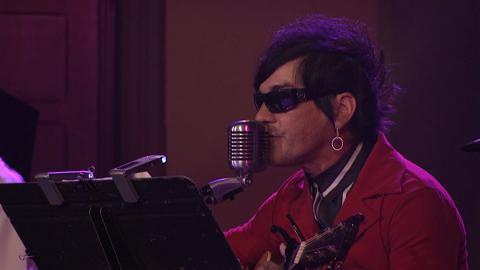
Los Illegals
This exclusive web extra features a performance by Los Illegals playing their version of the John Lennon tune "Working Class Hero." In this exclusive interview with KCET, Los Illegals bassist Jesus "Xiuy" Velo talks about their music and how Ricardo Flores Magón continues to be a source of inspiration.
Tell us about Los Illegals. When did the band start? How did it all come together?
Jesus "Xiuy" Velo:Los Illegals began in 1979 as a wandering as a band without direction. Los Angeles and Latinos in general were suffering from what we used to call "Santana-itis." No disrespect to the man, but every band on every corner of the barrio was doing nothing but Santana and there was no place to go. We never saw ourselves doing the "burrito circuit."These are the clubs that most of the Latino kids played to. And they didn't want to have anything to do with us anyway. So, we started watching what other Latino kids were doing in other parts of Latin America and they were pretty much stuck in a fit too. Nowhere to go. They actually kind of embarrassed us, you know, guys that looked ethnic like we did. But they were calling themselves things like Billy Glass and things like that. So we put something together that was relevant to the Latino, specifically to the Chicano community. It had some interest, fortitude, vitality, originality, and most importantly for us, it was bi-lingual and bi-cultural. After all we are Mexican and American, and in a respect Chicanos.

But we had nowhere to go. You either had to sign to a major record deal or were signed to a major label that was going to put you out there. Knowing this, our leader, Willie Herron of the group, had an art studio downtown East L.A., which is now known as Self-Help Graphics. Willie hooked up with Sister Karen Boccalero who was running the show there and she told him that she had a license to do a ballroom upstairs and that we should do our own club as an alternative. Los Illegals decided that we needed a way out. So, in gathering Willie's influence with the Self-Help Graphics and Sister Karen Boccalero we formed a partnership and created Club Vex because we were very vex about doing this. The idea was to bring Westside groups to the Eastside. Now, the stereotype under this and in all the books is that we started Vex to tear down the walls to Hollywood. That isn't true. The idea of Vex was to bring Westside/ Eastside, white and brown, black and white and Asian groups, and there were a few, together during the early 80's.
How would you describe the sound of Los Illegals?
The sound that we decided to look for was one that we had never heard before. We wanted to pull some of the stuff that our parents had but at the same time we wanted to be relevant and we wanted to make a statement that was so off the wall and illegal, and angry. We decided to mesh Tito Puente and timbales with harsh punk rhythms. In fact, the first press that came out started calling us Tito Puente on LSD, which we thought was great. That was the best thing for us and we stuck with that moniker whether we liked it or not. And we wanted to make a shocking statement. And we also wanted to teach our mother country, Mexico, to come on over and pick up the stuff. We also wanted to have a voice for the Latinos in a sharp, cutting edge, relevant and artistic way that hadn't been done before. The idea was to break the stereotypes.
How does this tribute to Ricardo Flores Magón relate to what was going on at that time with The Vex?
The most important thing to remember is that those who don't study their history are doomed to repeat it. This is what's happening today. The state of America is in flux and it's going through that vicious circle where its becoming that way again. And we have always been known and we have always been trailed by everybody from law enforcement to politicians and ostracized by both countries for being as politically truthful as we try to be. Today, it's important that we let everybody know what's happening. And we sort of wind up pulling the flag out and showing everybody this is important, we've got to pay attention to this. So, the Flores Magón situation is that we're doing the same thing. When Flores Magón came to the United States he wrote some treaties, right? And we're doing sort of the same thing. We were invited to this but if you look closely, we're the only band that is a punk band. We're not doing traditional stuff. There's wonderful bands like Quetzal. They're doing traditional instruments but it has to be deeper. It has to be further. It has to be more relevant to the kids that are out there that want something cutting edge. Sort of what we did in our time. We're just repeating that portion of history and sticking it up.
Tell us about "Working Class Hero." Why did you pick that song?
"Working Class Hero" was written by John Lennon and it was written during a time when Lennon was having a very hard time based on his political beliefs. He was anti-Vietnam and of course during that time of conservatism, I believe Nixon was the president then, it was very difficult for him to get across. Eventually he was going to be banned from the country and there was a whole FBI dossier on him. That was a very important song, but if you look carefully at that song, there's nothing that is not relevant or truthful today, except that it happened to be politically unpopular. And we're doing that song to be politically unpopular, not for the attention but to be politically unpopular, expose it to the children, the young students and to get them to jump right in with us. We all need to jump into the fire in order to turn it out.
The opening line is "As soon as you're born, they make you feel small, by giving you nothing instead of it all." One of the other parts that's very relevant is what they do, "Well, they fill you with credit and sex and TV. You live your life happy, fanciful, free. But you're still working it off, I can see."
Do you see Magón alive today?
It's important to remember, and this is why we're doing this, that there are no heroes anymore. We have to go back to history to find these heroes. The heroes that we have now are today, a nine year old, ten year old boy or girl. They're out there and they need this as an inspiration. They need this. This person who's going to be our hero and be our leader, the next Cesar Chavez, the next person like that, the next Dolores Huerta, going back all the way to Flores Magón, is a child right now and they're probably out there tonight. It's important that they see this and told that he's accepted in it and is told that it's okay. A young boy sees his parents in credit card debt, he sees his parents suffering through it all, he sees his parents working twelve hour days in two jobs, and he thinks it's not right when he sees somebody else taking more money out of their pockets through taxes than anybody else. Another thing that's important today that is relevant is that people tend to mis-understand anarchy and they tend to confuse it with communism and they are not the same.
Our definition of anarchy is one simple word: freedom. The freedom to do and choose and work and the freedom to not be oppressed by the culture of materialism that expects you to spend all your money, that expects you to use credit cards, expects you to want to get a better house, a better car. We need freedom from that. And first and foremost, we need freedom from the oppressive politics that are happening right now, the divisive politics. We need freedom from hardcore, elitist, right-wing parties.
About Los Illegals: Los Illegals is a seminal Chicano punk band from East Los Angeles. Willie Herron III (guitar, vocals), Jesus "Xiuy" Velo (bass, vocals), Sid Medina (of the Brat on guitar).



